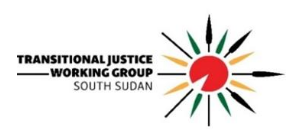Participants at the Transitional Justice Quarterly Forum who convened to assess the status, challenges, and way forward in advancing transitional justice in South Sudan on Tuesday emphasized the urgency of operationalizing key transitional justice institutions, particularly the Commission for Truth, Reconciliation, and Healing (CTRH), and to initiate steps towards establishing Hybrid Court for South Sudan.
The stakeholders from government institutions, civil society, and international partners, UNMISS, met at the Fire Tree Hotel in Juba. Participants expressed deep concern over mounting tensions that threaten the stability of the peace agreement.
According to a press statement extended to Radio Tamazuj, the participants stressed that without concrete progress on truth-seeking, accountability, and reparations, South Sudan’s journey toward sustainable peace remains fragile and uncertain.
“Held at a pivotal moment for the country, the forum focused on strengthening dialogue and coordination around the implementation of transitional justice mechanisms as outlined in the Revitalized Agreement,” the statement reads in part.
The participants urged the Transitional Government to halt hostilities, release political detainees, refrain from hate speech, and engage in inclusive dialogue in line with the spirit and letter of the peace agreement as part of creating a conducive environment for implementing transitional justice mechanisms and other key provisions of the agreement.
“Participants underscored the urgent need to operationalize key transitional justice institutions — particularly the Commission for Truth, Reconciliation, and Healing (CTRH) — and to initiate steps towards establishing the Hybrid Court for South Sudan,” the statement said. “Delays in their operationalization impede the pursuit of truth, accountability, and healing, undermining the reconciliation process, trust and confidence building, and the attainment of a durable peace in South Sudan.”
The forum also called upon political parties and affiliated entities to refrain from politicizing the transitional justice process and recommended clear and enforceable consequences for interference.
“The forum emphasized the importance of placing victims and survivors at the center of transitional justice efforts, ensuring full inclusion of women, youth, and marginalized communities in both the design and implementation phases,” the statement read in part,” the statement read in part. “The timely allocation and disbursement of sufficient funding for the CTRH and the Compensation and Reparation Authority (CRA) were called for, especially following the formal appointment of institutional leadership.”
“Civil society organizations, government representatives, and international partners reaffirmed their commitment to strengthening coordination and maintaining transparent, inclusive dialogue to address institutional and political barriers,” the statement added.
UNMISS officials reiterated their readiness to support South Sudan’s transitional justice efforts, while stressing that the process must be locally led and nationally owned
As the forum concluded, participants conveyed a unified message: Transitional justice is not a peripheral concern — it is a cornerstone of sustainable peace, national healing, and public trust in governance.
“Stakeholders — including national actors, regional bodies such as the African Union (AU) and Intergovernmental Authority on Development (IGAD), Peace Guarantors, the United Nations, Troika Countries, European Union (EU), and all the international partners — were urged to honor their commitments and ensure that justice is neither delayed nor comprised,” the statement concluded.
The Transitional Justice Working Group (TJWG) is a civil society platform that promotes transitional justice in South Sudan. It supports the implementation of Chapter V of the Agreement on the Resolution of the Conflict in South Sudan (ARCSS) and serves as a bridge between national and international stakeholders and the official transitional justice processes.




